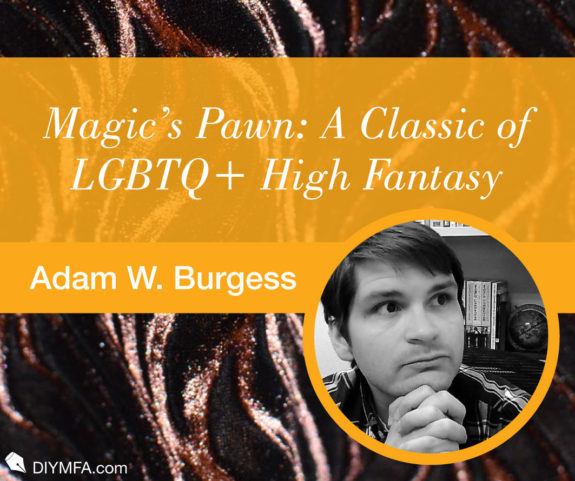Not long ago, I went hunting at my local Barnes & Noble for a high fantasy novel with an LGBTQ+ main character or plot. I’ve read a great deal of genre fiction lately that includes LGBTQ+ characters and themes, but this time, I wanted to see if I could find a fantasy novel elevating openly and explicitly gay characters, even one centering a same-sex romance. I wish there were more of this in mainstream fantasy fiction, but I have to say I lucked out in finding a book called The Last Herald-Mage Trilogy. The first title in this series is Magic’s Pawn.
About Magic’s Pawn
Magic’s Pawn was written by Mercedes Lackey and published in 1989. As a scholar of LGBT literature, I have to say this is remarkable. Not only is this an openly gay text with positive representation, but it’s also mainstream and was printed by a large fantasy press. It’s not surprising that it was written by a woman, as that was rather typical of accepted (“acceptable”) gay fiction up to the 1990s, when it began to be more and more common to see gay men writing and publishing their own stories more successfully (although—well, never mind, that’s a rabbit hole I won’t go down here.)
Lackey even mentions in her wonderful new introduction to the trilogy that she and her agent had serious discussions about the likelihood of this story ever seeing the light of day. Fortunately, they both took the courageous steps to get it out there, and it worked.
The Plot
The story follows young Vanyel, a beautiful but different noble person and heir to his father’s throne. At home, he is constantly bullied, persecuted, and abused because he is beautiful and soft, the opposite of what a leader is expected to be. His father, his tutor, and his brother all seem determined to grind Vanyel down; only his sister and his overbearing mother show him any love.
Eventually, Vanyel’s inability to grow into the masculine noble that his father demands is met with punishment: exile to Haven, where he will be tutored by his hard-as-nails aunt, the Herald Savil.
Surprisingly, however, this punishment turns out to be the greatest blessing. In Haven, Vanyel learns a lot about who he really is, what makes him different, yes, but also what makes him great. He finds companionship that develops into true love; he learns the secrets of his once dormant magical abilities, and he earns grudging respect from the most judgmental family and teachers. But all of this comes at a cost.
When Vanyel’s lover is drawn into a terrible battle and suffers a loss beyond consolation, Vanyel immediately rushes to his aid. The choices these two young, talented lovers make will bring about the end of their relationship, but also a great and painful transformation in Vanyel.
While Magic’s Pawn might not include as much wizardry as readers might expect from a “fantasy novel” with a wizard in the leading role, what it does provide is a unique and sensitive representation of a young gay man’s coming-of-age experience, including the difficult pillars of coming out and of falling in love. The very human elements of family and friendship, grief and loss, are also crucial to the story.
A Final Note
At the end of the introduction, Lackey describes the readers who have written to express their appreciation to her for this story. She mentions that many have called her a hero for daring to do that work, and for helping them to see themselves and understand themselves for the first time, through her fiction. It even encouraged young and older readers to come out. And here is her response:
You are the real heroes. I am proud and thrilled to have been part of your journey, but you began the journey, and you kept up with it until you came out on top. It was all you. I’m just glad to have been a part of it.
Mercedes Lackey
Now, remember, Lackey wrote and published this trilogy in the late-1980s/early-1990s, at the height of the AIDS crisis. Here she is, reaching out to a devastated, terrified community, giving them hope, a sense of place, and purpose. This is the power of writing and writing well.
Gay male writers in the United States who know their history will be forever indebted to the women who got them through one of the most devastating epidemics in human history. These women—including ally writers—were, and will forever be, heroes indeed.
Tell us in the comments: Have you read Magic’s Pawn? Do you have any other recommendations for LGBTQ+ high fantasy books?

Adam W. Burgess is an English Professor at College of Southern Nevada. He has a Ph.D. from Northern Illinois University and is pursuing a post-doc writing certificate at the University of California, Berkeley. He loves engaging in all topics related to LGBTQ literature and craft. You can find Adam on his website or follow him on Facebook, Twitter, and Instagram.







